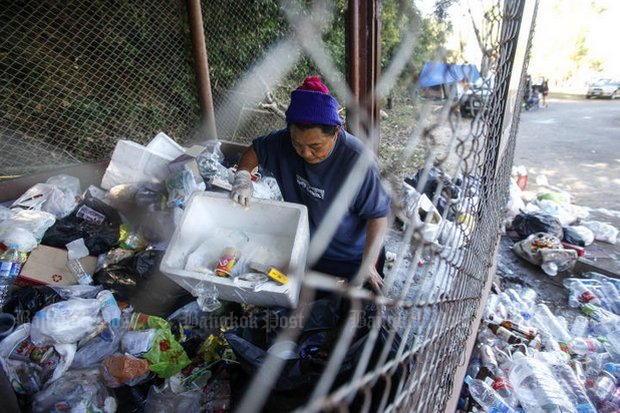
At national parks during the festive season every year, do you know what human behaviour I think is arguably far more disturbing than loud noises made by "drunken" visitors?
It's the careless and selfish habit of tourists, the majority of whom are our fellow Thais, who leave hundreds of tonnes of garbage piled up in the protected natural sites.
The upcoming New Year celebration is no exception. As many city people must have made plans to indulge themselves in nature and "recharge" their energy, it is unlikely the trashy behaviour of park visitors indiscriminately leaving their rubbish behind will go away.

Surasak Glahan is Deputy Editorial Pages Editor, Bangkok Post.
Yet our park officials are playing hardball against drinkers at these sites (a much smaller problem, I believe), while being much softer on litterers.
The head of the National Park, Wildlife and Plant Conservation Department on Sunday revealed a new measure to strictly prohibit alcohol consumption at its parks and threatened legal action against violators.
Well, that's fine. Drinking is not the most praiseworthy things to do there (even though I still wonder why it is completely banned).
But what about littering? The department late last month said it planned to renew its failed effort to "seek cooperation" from tourists to not litter in the parks.
Winter is the "to-die-for" time of the year for mostly domestic tourists, especially office workers in big cities who have had enough of year-long shopping and hanging out at hip places, to head for high-altitude spots in mountainous national parks.
According to the department, there were 12.9 million visitors to national parks last year, generating 1.9 billion baht in revenue.
It is estimated that each tourist generated 0.5 kilogrammes of rubbish per day. The agency was left to deal with 500 tonnes of waste which is seen as beyond the authorities' capacity to handle.
After the 2016 New Year celebration, Doi Inthanon National Park in Chiang Mai was left with over 70 tonnes of garbage to clean up, generated by 70,366 tourists during a four-day period.
Khao Yai National Park in Nakhon Ratchasima came second, with 24 tonnes of rubbish, followed by Noppharat Thara Beach-Phi Phi Island National Park in Krabi, Erawan National Park in Kanchanaburi and Phu Kradueng National Park in Loei, according to the news agency PPTV, citing figures provided by the department.
With the upcoming New Year, it looks like the department is still wary of spoiling the festive feelings of travellers and is avoiding being too strict on garbage dumping.
It will let revellers carry on with their habit of spoiling nature which they can do with relatively little risk of being punished.
Yet if the agency can mobilise resources to crack down on drinking alcohol, it could have done the same with littering.
It is possible some drunks may harm animals and disturb others as claimed by the department. But such a conclusion is judgmental, given that not all people drinking end up causing problems.
In fact, an urgent measure needed at national parks is a total ban on dumping trash and fines for violators.
In previous years, the department asked for cooperation from park visitors to take garbage home and avoid bringing foam containers with them into the parks.
Park officials even distributed rubbish bags to visitors on their way to the parks, asking them to leave the bags at designated spots.
Some holidays-makers cooperated, others ignored the requests.
Images of beaches and mountains being spoiled with plastic and foam waste pop up in media reports every year after New Year.
In the end, officials at the parks and local administration offices have to bring in large trucks to take the rubbish away from the parks to incinerators.
But there is so much trash, including some which is not easily biodegradable, that officials have had to bury some of it in the parks rather than take it out with them.
It is not just protected places that suffer this kind of irresponsible behaviour; other tourist hot spots have also fallen prey to it.
According to the UN Environment Programme, Thailand is the sixth-biggest polluter in terms of plastic waste that enters the oceans and threatens marine life
Our 24 coastal provinces produce about 1 million tonnes of waste every year, and about 10% is believed to be released into the seas, according to the Ministry of Natural Resources and Environment.
But our authorities seem tolerant of such behaviour.
For instance, in January, the Pollution Control Department said it would work with local administrative organisations to improve waste management in four tourist spots: Koh Samet in Rayong, Pattaya in Chon Buri, Koh Phi Phi in Krabi, and Petchabun province, "to make those destinations more appealing to tourists".
The agencies should not be constantly cleaning up the mess made by tourists and making things look nice for their next visit.
Rather than hunting down drinkers (many of whom may not be aware of the new rule yet), our state agencies should have made dumping rubbish in these protected areas illegal.
They should also run campaigns seeking not just cooperation from tourists not to litter, but to shame those who dump garbage at the parks, and fine them.
Of course, if a garbage ban is imposed there won't be enough officials to keep their eyes on every tourist.
But the measure would send a strong message that this habit is not to be tolerated and is illegal. Tourists can then keep an eye on each other's littering behaviour.
We don't have to waste human and financial resources cleaning up rubbish at these beautiful natural sites. We need to clean up the trashy habits of our tourists.
